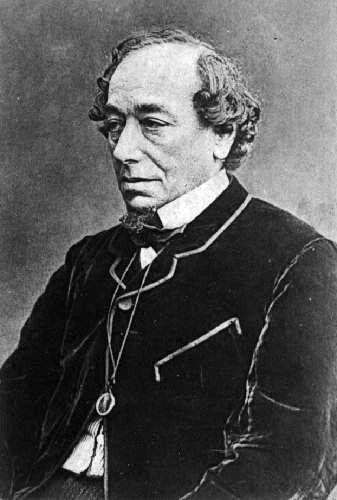Benjamin Disraeli frasi celebri
citato in Nicola Martella, Offensiva intorno a Gesù, vol II, Punto a croce 2000
Origine: Citato in Curzio Nitoglia, Per padre il diavolo: un'introduzione al problema ebraico secondo la tradizione cattolica, Barbarossa, 2002, p. 208.
Benjamin Disraeli Frasi e Citazioni
“La gioventù è un agire da sciocchi, la maturità una lotta, la vecchiaia un rimpianto.”
Origine: Citato in Focus, n. 115, p. 170.
“La delusione della maturità segue l'illusione della gioventù.”
Origine: Citato in Focus n. 67, p. 169.
“[Ultime parole famose, nel 1858] Il canale di Suez? Assolutamente impossibile da realizzare.”
Origine: Citato in Focus n. 97, p. 188.
“Quel che è delitto fra la moltitudine è soltanto un vizio fra i pochi.”
da Tancred, or the New Crusade, 1847
“Tutto è razza e non c'è altra verità.”
1847, vol. I, p. 169; citato in Losurdo 2005, p. 267
“Un governo conservatore è ipocrisia organizzata.”
dal discorso alla Camera dei Comuni del 17 marzo 1845
“Un politico usa i dati come un ubriaco il lampione: non per la luce ma per il sostegno.”
Origine: Citato in La settimana enigmistica, n. 4102, pag. 12
Benjamin Disraeli: Frasi in inglese
Origine: Speech in Wycombe (30 October 1862), quoted in William Flavelle Monypenny and George Earle Buckle, The Life of Benjamin Disraeli, Earl of Beaconsfield. Volume II. 1860–1881 (London: John Murray, 1929), p. 98.
Origine: Speech http://hansard.millbanksystems.com/commons/1845/feb/28/opening-letters-at-the-post-office in the House of Commons (28 February 1845), referring to Sir Robert Peel.
Misattributed to Gladstone to Disraeli.<!-- this is unclear -->
Misattributed
The Wondrous Tale of Alroy, pt. 5, ch. 5 (1833).
Books
Speech http://hansard.millbanksystems.com/commons/1876/aug/11/turkey-the-alleged-atrocities-in in the House of Commons (11 August 1876)
1870s
From the Enchiridion (1640) of Francis Quarles.
Misattributed
“I suppose, to use our national motto, something will turn up.”
Popanilla http://www.gutenberg.org/etext/7816 (1827) Ch. 7 referring to the Motto of "Vraibleusia".
Books
Origine: Speech at the opening of Shaftesburgh Park Estate (18 July 1874), cited in Wit and Wisdom of Benjamin Disraeli, Collected from his Writings and Speeches (1881), p. 38.
Origine: Letter to Charles Attwood (7 June 1840), quoted in William Flavelle Monypenny and George Earle Buckle, The Life of Benjamin Disraeli, Earl of Beaconsfield. Volume I. 1804–1859 (London: John Murray, 1929), p. 486
Origine: Speech https://api.parliament.uk/historic-hansard/commons/1863/feb/05/address-to-her-majesty-on-the-lords#column_96 in the House of Commons (5 February 1863).
Origine: Speech at the Guildhall, London (9 November 1877), quoted in 'Lord Mayor's Day.', The Times (10 November 1877), p. 10.
That would not make a bad programme for a British Ministry. It is one from which Her Majesty's advisers do not shrink.
Origine: Speech at the Guildhall, London (9 November 1879), cited in William Flavelle Monypenny and George Earle Buckle, The Life of Benjamin Disraeli, Earl of Beaconsfield, Vol. 2 (1929), pp. 1366-7.
Book I, Chapter 5.
Books, Coningsby (1844), The Young Duke (1831)
“Upon the education of the people of this country the fate of this country depends.”
Origine: Speech http://hansard.millbanksystems.com/commons/1874/jun/15/motion-for-a-select-committee in the House of Commons (15 June 1874).
“Though I sit down now, the time will come when you will hear me.”
Maiden speech https://www.oxfordreference.com/view/10.1093/acref/9780191843730.001.0001/q-oro-ed5-00003685 in the House of Commons (7 December 1837). Disraeli was being shouted down by other MPs. Compare: "I will be heard", William Lloyd Garrison, Salutatory of the Liberator
1830s
Origine: Speech in the House of Lords (10 December 1876), quoted in William Flavelle Monypenny and George Earle Buckle, The Life of Benjamin Disraeli, Earl of Beaconsfield. Volume II. 1860–1881 (London: John Murray, 1929), p. 1273.
Isaac D'Israeli, Curiosities of Literature.
Misattributed, Isaac D'Israeli
Origine: Books, Coningsby (1844), The Young Duke (1831), Chapter 10.
“A consistent man believes in Destiny — a capricious man in Chance.”
Book VI, Chapter 22.
Books, Coningsby (1844), Vivian Grey (1826)
Origine: Letter to Lady Chesterfield (27 June 1880), quoted in the Marquis of Zetland (ed.), The Letters of Disraeli to Lady Bradford and Lady Chesterfield. Vol. II, 1876 to 1881 (London: Ernest Benn Limited, 1929), p. 279.
"The Value of Literature to Men of Business," speech at the Manchester Athenaeum (23 October 1844), cited in Selected Speeches of the Late Right Honourable the Earl of Beaconsfield, Vol. 2 (1882), p. 625.
1840s
Speech in the House of Lords (29 April 1879), reported in The Times (30 April 1879), p. 8.
1870s
“A University should be a place of light, of liberty, and of learning.”
Origine: Speech http://hansard.millbanksystems.com/commons/1873/mar/11/second-reading-adjourned-debate in the House of Commons (11 March 1873).
“Increased means and increased leisure are the two civilizers of man.”
Origine: Speech to the Conservatives of Manchester (3 April 1872), cited in The World's Best Orations from the Earliest Period to the Present Time, Vol. 1 (eds. David Josiah Brewer, Edward Archibald Allen, William Schuyler), pp. 309-338.
“Gentlemen, the Tory party, unless it is a national party, is nothing.”
Origine: Speech at banquet of the National Union of Conservative and Constitutional Associations, Crystal Palace, London (24 June 1872), cited in "Mr. Disraeli at Sydenham," The Times (25 June 1872), p. 7.
Origine: Speech to a Conservative dinner (26 June 1863), quoted in William Flavelle Monypenny and George Earle Buckle, The Life of Benjamin Disraeli, Earl of Beaconsfield. Volume II. 1860–1881 (London: John Murray, 1929), p. 114
“Something unpleasant is coming when men are anxious to tell the truth.”
Book IV, Chapter 6.
Books, Coningsby (1844), The Young Duke (1831)
Origine: Books, Coningsby (1844), Lothair (1870), Ch. 49.
